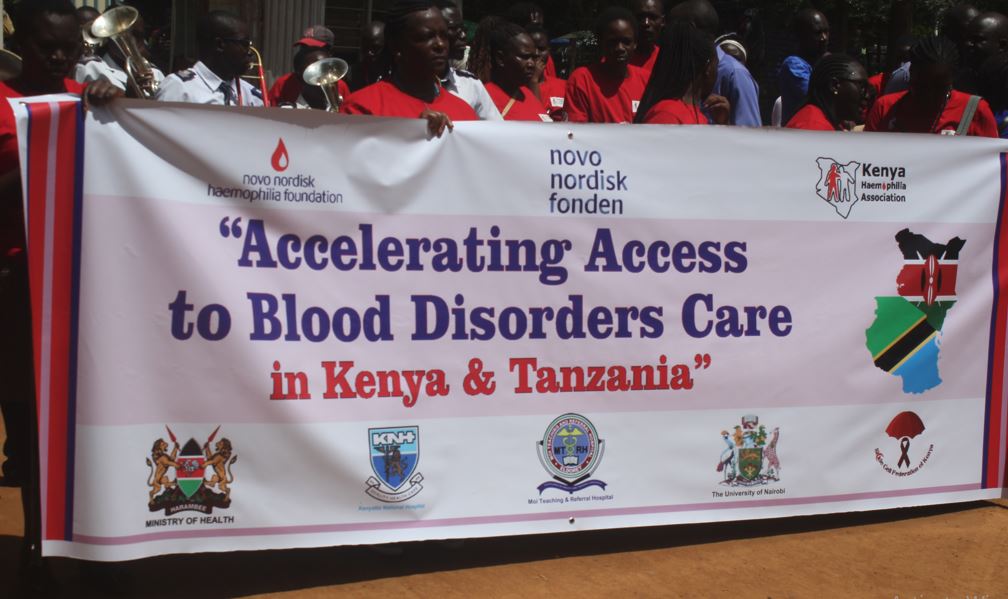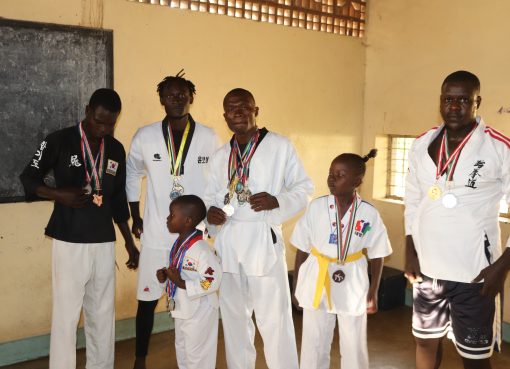Hemophilia and sickle cell patients in Western region are breathing a sigh of relief after the Bungoma County Referral Hospital launched a clinic to ease access to hemophilia services.
County Executive Committee Member for health and sanitation, Dr. Andrew Wamalwa who presided over the launch said a total of 692 children in Bungoma are affected by sickle cell, while three cases of hemophilia are being handled.
According to experts, Sickle cell anemia is one of a group of inherited disorders known as sickle cell disease. It affects the shape of red blood cells, which carry oxygen to all parts of the body.
Red blood cells are usually round and flexible, so they move easily through blood vessels. In sickle cell anemia, some red blood cells are shaped like sickles or crescent moons. These sickle cells also become rigid and sticky, which can slow or block blood flow.
There’s no cure for most people with sickle cell anemia but treatments can relieve pain and help prevent complications associated with the disease.
“A research conducted in Bungoma by a group of experts showed that Bungoma and Nyanza regions have high incidences of sickle cell patients hence the reason we partnered with the national government to start this center,” he said.
Dr. Wamalwa said that hemophilia is a disorder in which the blood doesn’t clot in the typical way because it lacks enough blood- clotting proteins (clotting factors) affirming that currently, the facility has the two major factors (8 and 9) that hemophilia patients lack.
Dr. Wamalwa said that in February, with the support of the national government, Bungoma acquired a refrigerated centrifuge to help manufacture blood components for sickle cell and hemophilia patients.
He added that if a patient has hemophilia, he/she might bleed for a longer time after an injury than if his/her blood clotted properly.
He said that so far, Bungoma has three hemophilia patients that the facility was monitoring adding that Bungoma has equipment to treat hemophilia and scan for the sickle cell diseases.
“If we want to help control the many numbers of sickle cell cases in both Bungoma and Nyanza, then we need to embrace scanning before marrying or intermarrying,” he said, noting that if people continue marrying from the same region then the cases won’t go down.
He said that Bungoma has 692 children with sickle cell adding the symptoms of hemophilia include unexplained and excessive bleeding from cuts and other injuries, including injuries after surgery.
“It has been tiresome to have to travel to Eldoret to access hemophilia healthcare services,” stated Antony Asimuge, a parent to a patient who received hemophilia treatment in Eldoret recently.
Dr. Dickens Lubanga, a pediatrician at Bungoma County Referral hospital said that many people have not been sensitized on how to handle hemophilia disease stating that World hemophilia day gives time and opportunity for the locals to be sensitized about it.
According to the Kenya Hemophilia Association, hemophilia is an inherited bleeding disorder where blood takes a long time to clot.
It can lead to spontaneous bleeding, excessive bleeding following injuries or surgeries. People with hemophilia lack clotting factors with two major types namely Hemophilia A (Factor VIII deficiency) and Hemophilia B (Factor IX Deficiency).
Signs and symptoms of hemophilia are, bleeding in the joints that cause swelling, pain or tightness in the joints.
Lubanga says the disease commonly affects the knees, elbows and ankles.
“Bleeding in the muscles and soft tissue causes a build-up of blood leading to a hematoma and bleeding from the gums after dental procedure may take long to stop,” he says.
He said the disease commonly affects the male population. Females are carriers but can sometimes have bleeding symptoms including prolonged and heavy menses.
Ben Mosongo who has lived with the condition since birth, says he realized he had the disease when he was playing football at the age of five.
He fell and got a swelling on the knee and was hospitalized for six months and diagnosed with Hemophilia. “Living with hemophilia is not easy since the medication is costly. A dose costs Sh50, 000,” he said.
Ben appealed to the government to recognize hemophilia patients as disabled persons and include them in the NHIF scheme and also include hemophilia in the school curriculum so as to create awareness about it.
Present were the County Director of medical services Caleb Watta and Medical Superintendent Bungoma County Referral Hospital Dr. David Wanikina.
The launch of the clinic coincided with the World Hemophilia Day.
Bungoma commemorated the day by marching around the town to create awareness of the disease to the public.
By Rebecca Muchai and Violet Omasaja




